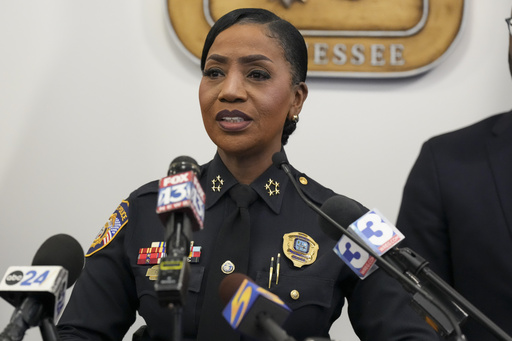MEMPHIS, Tenn. — On Thursday, the Mayor of Memphis, Paul Young, expressed his opposition to the necessity of a Justice Department agreement aimed at reforming the Memphis Police Department, following the alarming findings from a national investigation. Young emphasized that numerous positive adjustments have already been implemented in the city since the tragic death of Tyre Nichols.
While he did not dismiss the possibility of considering a consent decree with the Justice Department in the future, Mayor Young maintained that he believes Memphis can effectively implement changes without entering into a binding agreement. The federal investigation, which unfolded over 17 months following Nichols’ death, revealed that officers in Memphis often employed excessive force and disproportionately targeted Black individuals.
Young remarked at a press conference, “We are confident that we can make more impactful and meaningful changes by collaborating with community feedback and outside national experts rather than relying on a bureaucratic and costly federal consent decree.” His comments came shortly after a high-ranking Justice Department official hinted at possible legal action if the city declines to sign an agreement for reforming the police department.
With a police-friendly administration anticipated to take charge in Washington, it seems the city may be adopting a wait-and-see approach, hoping the Justice Department under a Trump administration might let these issues go. Both officials from the Justice Department and the city refrained from discussing this speculation; the mayor insisted he would uphold this stance regardless of the presidential race’s outcome, while acting U.S. Attorney Reagan Fondren stated that federal prosecutors will persist in their efforts irrespective of the administration.
The findings from the investigation indicated that officers in the second-largest city in Tennessee had violated civil and constitutional rights of its residents. Assistant U.S. Attorney General Kristen Clarke characterized the extensive review as “thorough and comprehensive” during a news conference held the same day. Clarke noted that the police practices in place not only breach the Constitution and federal regulations but also exacerbate distrust among the community, thereby undermining the core mission of a police department.
The investigation was catalyzed by the fatal beating of Tyre Nichols, an incident that occurred after he attempted to flee from a traffic stop in January 2023. The report unveiled significant flaws within the police department’s operations, such as the use of unjustified force and systemic mistreatment of Black citizens within the largely Black community. Nichols, who suffered brutal attacks from police, passed away three days after his interaction with law enforcement. His death sparked widespread protests, increased demands for national police reforms, and intensified scrutiny of the Memphis Police Department, which counts more than half of its members as Black, including Chief Cerelyn “CJ” Davis.
The federal investigation scrutinized the department’s “pattern or practice” when it came to the use of force, conducting stops, searches, arrests, and whether it engaged in discriminatory policing practices. Findings showed that officers often engaged in physical violence against individuals who were already restrained while such actions were subsequently authorized by supervisors. The investigation concluded that officers frequently employed force that could lead to injury in response to minor nonviolent offenses, even when individuals were not exhibiting aggressive behavior.
The report further highlighted systematic bias, noting that Black residents were cited or arrested for loitering or curfew violations at rates 13 times higher than white residents, while they faced disorderly conduct charges at a rate 3.6 times greater than their white counterparts. Police footage displayed Nichols being pepper-sprayed and tased before he made a run for it during a traffic stop. In a chilling sequence, five officers pursued him just steps from his home while he pleaded for his mother. The video captured the officers standing by, discussing and laughing as Nichols struggled with his injuries.
Following the incident, the officers involved were terminated from their positions, faced murder charges in state court, and were indicted by a federal grand jury on charges related to civil rights violations and witness tampering. Two of the officers accepted plea deals, while the other three experienced mixed verdicts in their trial. The report referenced other troubling incidents, including one involving officers who pepper-sprayed, kicked, and tased an unarmed man with mental illness for attempting to steal a soda from a convenience store.
Critically, the investigation pointed out training practices within the police department that seemed to condition officers to resort to force rather than utilize verbal engagement to resolve situations. Instruction included troubling messages such as, “If a fight is unavoidable, hurt them first and hurt them bad.” In a letter to the Justice Department’s Civil Rights Division, the city attorney mentioned that while Memphis had received the request for a DOJ consent decree, the city would not agree until a full review of the report was completed.
Consent decrees mandate reforms that are monitored by an independent entity and sanctioned by a federal judge. Such oversight can endure for extended periods, and any violations may lead to fines imposed on the city. Other police departments have encountered similar federal investigations in recent years, including the Minneapolis police force in the wake of George Floyd’s death and the Louisville Police Department following the fatal shooting of Breonna Taylor.
